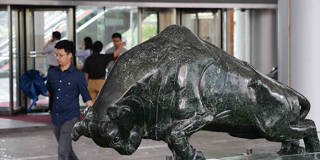The dizzying plunge in the Shanghai and Shenzhen stock exchanges is testing China’s Communist rulers. As the realization sinks in that Chinese stock prices can decline, just as they have risen, the government is taking desperate, if clumsy, measures to control the free fall.
BERKELEY – The recent dizzying plunge in the Shanghai and Shenzhen stock exchanges has posed a unique test for China’s Communist rulers. So long as the markets were rising, the paradox of vigorous capitalist development overseen by the world’s largest and strongest Communist party confounded only academics and old-school Marxists. As the Chinese Communist Party elite and their relatives, foreign financial institutions, and some Chinese small investors (enabled by margin lending) made money on stocks, no one bothered to comprehend the mutant creature they were milking.
But now, as the realization sinks in that Chinese stock prices will not keep rising indefinitely, the CCP is taking desperate, if clumsy, measures to control the correction. All new initial public offerings have been halted, and much trading has been curtailed; the central bank has been asked to help the China Securities Finance Corporation induce investors to buy shares and thus stabilize the market. Indeed, even the country’s sovereign wealth fund has gotten into the act.
But, unlike in other capitalist economies, money is not the only tool at the authorities’ disposal. If your brokers in China advise you to sell shares, they must be careful not to appear to be rumormongers, subject to official punishment. And there are reports that sales of large holdings may trigger investigations by the authorities. Causing public disorder or financial instability can be a serious offense in China, where conspiracy theories about foreigners’ efforts to undermine the economy abound.

BERKELEY – The recent dizzying plunge in the Shanghai and Shenzhen stock exchanges has posed a unique test for China’s Communist rulers. So long as the markets were rising, the paradox of vigorous capitalist development overseen by the world’s largest and strongest Communist party confounded only academics and old-school Marxists. As the Chinese Communist Party elite and their relatives, foreign financial institutions, and some Chinese small investors (enabled by margin lending) made money on stocks, no one bothered to comprehend the mutant creature they were milking.
But now, as the realization sinks in that Chinese stock prices will not keep rising indefinitely, the CCP is taking desperate, if clumsy, measures to control the correction. All new initial public offerings have been halted, and much trading has been curtailed; the central bank has been asked to help the China Securities Finance Corporation induce investors to buy shares and thus stabilize the market. Indeed, even the country’s sovereign wealth fund has gotten into the act.
But, unlike in other capitalist economies, money is not the only tool at the authorities’ disposal. If your brokers in China advise you to sell shares, they must be careful not to appear to be rumormongers, subject to official punishment. And there are reports that sales of large holdings may trigger investigations by the authorities. Causing public disorder or financial instability can be a serious offense in China, where conspiracy theories about foreigners’ efforts to undermine the economy abound.